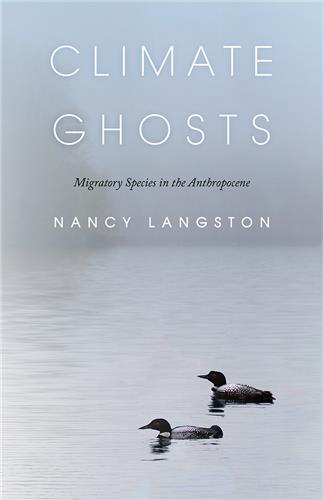Climate Ghosts is as much a call to address the violent and ongoing legacies of settler colonial racism, as it is to salvage particular animals and ecosystems in decline. This is a must read book—written with humility, head, and heart.
Climate Ghosts deals with the important issue of climate change and human impact on three species: woodland caribou, common loons, and lake sturgeon.
Environmental historian Nancy Langston explores three “ghost species” in the Great Lakes watershed—woodland caribou, common loons, and lake sturgeon. Ghost species are those that have not gone completely extinct, although they may be extirpated from a particular area. Their traces are still present, whether in DNA, in small fragmented populations, in lone individuals roaming a desolate landscape in search of a mate. We can still restore them, if we make the hard choices necessary for them to survive. In this meticulously researched book, Langston delves into how climate change and human impact affected these now ghost species. Climate Ghosts covers one of the key issues of our time.


This is a must read book—written with humility, head, and heart.
Brinda Sarathy
University of Washington
Climate Ghosts is as much a call to address the violent and ongoing legacies of settler colonial racism, as it is to salvage particular animals and ecosystems in decline. This is a must read book—written with humility, head, and heart.
Nancy Langston has written a stunning work of environmental history that illuminates the challenges facing wildlife vulnerable to climate change. While the book carries a dire warning, Langston draws hope from recent restoration programs, arguing that species on the brink should not be written off as doomed.
By centering Indigenous rights and values, Langston shows how we can deepen our relationships with other human beings, and with fish, birds, and mammals; she understands each other as relatives. Climate Ghosts challenges us to engage critically with Indigenous dispossession, ecosystem change, and species restoration.
Maang, nme, adik (loon, sturgeon, caribou) are our older siblings. To the Anishnabek, these are relatives with as much right to be here as we have, and to treat a relative as a ‘resource’ is shameful. In this impassioned and detailed account, Nancy Langston shows how our lifeways are harming our siblings. She makes clear what will happen not only to our older siblings but to ourselves if we do not change.
Historical information, dating back several centuries, is skilfully combined with details on present and planned restoration actions, providing insights into the past, present and possible future of these threatened species. Throughout the book, the prose flows well and without complex jargon, making this an enjoyable and accessible read. I would highly recommend Climate Ghosts to anyone interested in migratory species and climate change.
Nancy Langston supplies three examples of seemingly impossible and precarious recovery stories for migratory species that offer ways forward for anyone interested in addressing environmental inequality and climate change's impacts on migratory species…Through the stories of caribou, sturgeon, and loons, Climate Ghosts challenges its readers to examine personal and societal relationships and responsibilities to migratory species.
Like the species it examines, Climate Ghosts covers a lot of ground.... We learn about the animals’ biology, the cultural beliefs regarding them, the reasons for their decline, and the efforts to restore them. This is a story of trauma and loss, one that asks, “How do we keep from turning away?”. But it is also one that provides some hope in the dark and a possible way forward.
Beyond providing basic biological
information of these ghost species, Nancy Langston takes the
reader on a scientific and cultural tour in the far North, analyzing
the combined effects of accelerated climatic processes
and Anthropocene land-use change, as well as showing the
spiritual depths of the Indigenous tribes who consider caribous,
sturgeons, and loons totems... The volume has a well-deserved place on the bookshelves of ecologists, conservationists, and cultural anthropologists.
Teachers seeking contemporary examples to use to discuss climate change, threatened species, habitat destruction, and human impact need look no further: Climate Ghosts has that and more.
The most recent addition to The Mandel Lectures in the Humanities at Brandeis University series, Prof. Langston brings her readers a profound message of both warning and encouragement to action, of the potential for tragedy and the potential for renewal. While what has already happened cannot be changed, what happens next can be; but to act wisely, an understanding of these species in and of themselves as well as their existence in their environment must be achieved. Climate Ghosts is clearly a step towards such knowledge.
Nancy Langston is distinguished professor of environmental history at Michigan Technological University. Langston was trained both as an environmental historian and as an ecologist. In addition to numerous peer-reviewed journal articles and popular essays, she is the author of Forest Dreams, Forest Nightmares: The Paradox of Old Growth in the Inland West; Where Land and Water Meet: A Western Landscape Transformed; Toxic Bodies: Hormone Disruptors and the Legacy of DES; and Sustaining Lake Superior: An Extraordinary Lake in a Changing World. Langston is a former president of the American Society for Environmental History and former editor-in-chief of the field’s flagship journal, Environmental History.

Founded in 1971, Brandeis University Press is a nonprofit publisher dedicated to publishing innovative, high-quality books for a general audience, as well as scholarship that advances knowledge and promotes dialogue in the humanities, arts, and social sciences around the world.
© Copyright 2024, Brandeis University Press
Brandeis University Press
Goldfarb Library 69-235, MS 046
Brandeis University
415 South Street
Waltham, MA 02453
(781) 736-4547
pressinfo@brandeis.edu

Stay up to date with the newest titles and promotions from Brandeis University Press—while saving 20% on your first purchase.